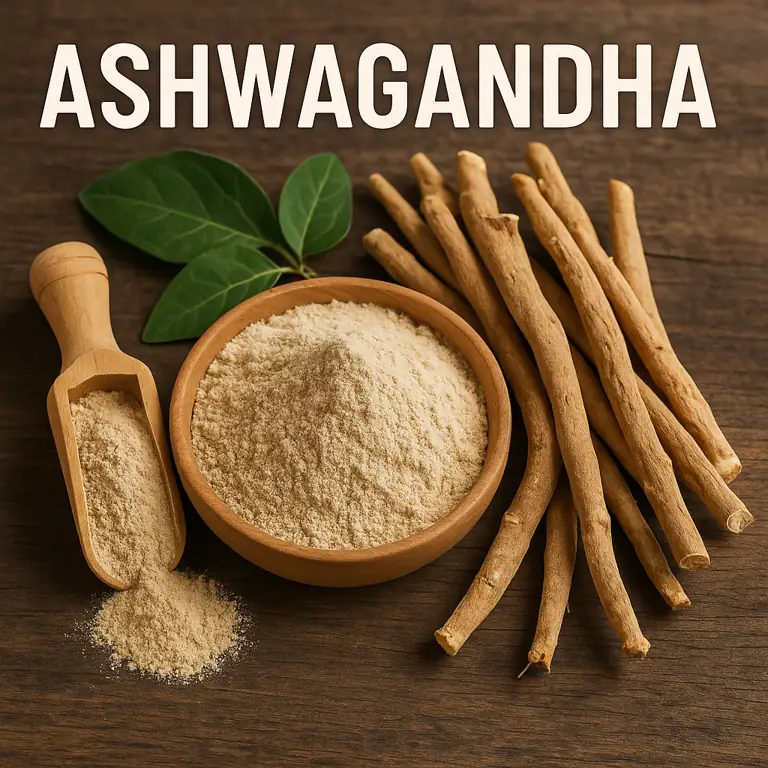Discover the Benefits of Ashwagandha: Your Ultimate Guide
What is Ashwagandha?
Ashwagandha, scientifically known as Withania somnifera, is an ancient herb that has held a prominent position in Ayurvedic medicine for over 3,000 years. Classified as an adaptogen, it is renowned for its ability to help the body cope with stress and promote overall wellness. The term “adaptogen” refers to natural substances that increase the body’s resistance to physical, environmental, and emotional stressors, hence enhancing its resilience.
In Ayurvedic tradition, ashwagandha is revered not only for its adaptogenic properties but also for its multifaceted health benefits. The herb is derived from the root and leaves of the ashwagandha plant, which is native to India and North Africa. Its name translates to “smell of the horse,” a reference to both its distinct aroma and the herb’s reputed ability to enhance vitality and strength.
The significance of ashwagandha in traditional medicine extends beyond mere stress management. Various studies have suggested that this powerful herb may also play a role in improving cognitive function, enhancing stamina, reducing inflammation, and bettering immune health. This makes it an appealing supplement for individuals looking to support their physical and mental well-being. By integrating ashwagandha into a holistic health regimen, practitioners of Ayurveda aim to foster balance within the body and promote a sense of harmony in one’s life.
As interest in alternative medicine continues to grow, ashwagandha has gained recognition worldwide and is now available in various forms, such as powders, capsules, and liquid extracts. As with any supplement, consult a healthcare provider to determine the appropriate dosage and ensure its suitability for individual health needs.
Origin and Cultivation
Ashwagandha, scientifically known as Withania somnifera, is an ancient herb with a rich history that dates back over 3,000 years. Primarily, it has been used in Ayurvedic medicine, esteemed for its adaptogenic properties. Its origins can be traced to the Indian subcontinent and parts of North Africa, where it has traditionally been used to enhance vitality and reduce stress. The term “Ashwagandha” in Sanskrit translates to “smell of a horse,” reflecting its historical use for promoting strength and stamina.
The cultivation of Ashwagandha typically occurs in dry and arid regions, favoring a warm climate with well-drained, sandy loam soil. The plant is resilient and can adapt to varying soil types, although it thrives best in temperatures ranging from 20°C to 30°C. Ashwagandha is generally grown as an annual in tropical and subtropical areas, requiring moderate rainfall or irrigation to sustain growth without causing waterlogging. Farmers often opt for manual methods for cultivation, as these practices support organic farming principles and superior quality of the herb.
The harvesting of Ashwagandha occurs approximately six to eight months after planting, during which the mature roots are dug up, ensuring minimal disturbance to the root system. After harvesting, the roots are cleaned and dried in sunlight, which is crucial for preserving their therapeutic constituents. Once dried, the roots can be ground into a powder for use in supplements and herbal formulations. The entire process from cultivation to harvesting requires careful attention to maintain the high quality and potency of the Ashwagandha root, reflective of its esteemed status in traditional medicine systems.
How Ashwagandha Works in the Body
Ashwagandha, scientifically known as Withania somnifera, is an adaptogenic herb widely recognized for its ability to help the body manage stress and enhance overall well-being. The primary active compounds in Ashwagandha are withanolides, which are steroidal lactones that contribute to its numerous health benefits. These withanolides showcase anti-inflammatory, antioxidant, and neuroprotective properties, making them instrumental in promoting mental and physical health.
When Ashwagandha is consumed, its active compounds interact with the body’s physiological systems to modulate stress responses. Withanolides influence the hypothalamic-pituitary-adrenal (HPA) axis, a critical component of the body’s stress response system. By regulating cortisol levels, the main stress hormone, Ashwagandha helps to alleviate the body’s physiological reactions to stress, which can lead to improved relaxation and mental clarity. Research suggests that regular intake of Ashwagandha can significantly lower anxiety levels and promote a sense of calm, allowing individuals to cope better with daily challenges.
Additionally, the benefits of Ashwagandha extend beyond stress relief. The herb has been shown to enhance cognitive function, which can lead to increased mental clarity and focus. The neuroprotective properties of withanolides contribute to improved synaptic plasticity, which is essential for learning and memory. Furthermore, Ashwagandha may boost energy levels by enhancing mitochondrial function within cells, which assists in optimizing the body’s energy production processes.
In summary, Ashwagandha’s active compounds work synergistically to offer a holistic approach to health by addressing stress, mental clarity, and energy levels. As more research unveils the mechanisms of action behind this ancient herb, individuals seeking natural methods for enhancing well-being may find Ashwagandha to be an invaluable addition to their wellness routine.
Common Uses of Ashwagandha
Ashwagandha, a revered herb in traditional Ayurvedic medicine, is celebrated for its diverse applications in promoting health and well-being. This adaptogenic herb is often used to help alleviate stress, enhance mental clarity, and support overall vitality. Its versatility allows it to be incorporated into various supplements and natural products that cater to different preferences and lifestyles.
One of the most popular forms of Ashwagandha is through dietary supplements, available in capsules or tablets. These forms are convenient for individuals seeking a straightforward way to include this herb in their daily routine. Typically, doses range from 300 mg to 600 mg, ensuring potential users can find the right amount based on their health needs and recommendations from health practitioners.
Ashwagandha powders are another common method of consumption, offering flexibility in how one can incorporate the herb into their diet. This powdered form can be mixed into smoothies, oatmeal, or even hot beverages like herbal teas or warm milk, enhancing the nutritional profile of these foods while promoting its relaxing benefits. As a powder, Ashwagandha allows for tailored dosages and personal preferences in taste.
Moreover, the tincture form of Ashwagandha provides a concentrated extract that is easily absorbed by the body. Tinctures can be taken directly or added to water or juice, providing a rapid bioavailability that appeals to those who prioritize efficiency in their wellness routines. The liquid form is particularly beneficial for users who prefer a more potent and immediate effect.
In summary, Ashwagandha can be utilized in numerous ways, including capsules, powders, and tinctures, enabling users to select the most suitable form based on their individual preferences and health goals, thereby encouraging a more holistic approach to well-being through this ancient herb.
Health Benefits of Ashwagandha
Ashwagandha, a prominent herb in Ayurvedic medicine, is celebrated for its wide-ranging health benefits. Known scientifically as Withania somnifera, it has been utilized for centuries for stress relief. One of the most well-documented advantages of Ashwagandha is its adaptogenic properties. This means that it helps the body adapt to stressors, thereby reducing anxiety levels and promoting a sense of calm. Studies have indicated that regular consumption of this herb might lead to significant reductions in cortisol, the stress hormone, which can contribute to overall mental well-being.
In addition to its stress-relieving effects, Ashwagandha is also associated with improved sleep quality. Many individuals who incorporate Ashwagandha into their daily routines report a much better sleep experience, falling asleep faster and achieving deeper, more restorative sleep. This enhancement in sleep can have cascading positive effects on mental clarity, mood, and overall health.
The cognitive benefits of Ashwagandha extend beyond just stress relief and sleep. Research suggests that it may enhance cognitive functions, including memory, attention, and overall mental performance. By supporting neuroprotection and promoting neural communication, this herb can be particularly beneficial for those looking to improve their focus and cognitive agility.
Moreover, Ashwagandha is being increasingly recognized for its potential to improve physical performance and endurance. Numerous studies have shown that athletes and active individuals might experience greater strength, muscle recovery, and stamina when using this herb as part of their regimen. The anti-inflammatory and antioxidant properties of Ashwagandha may contribute to better recovery post-exercise, making it an appealing option for those seeking to enhance their physical capabilities.
Dosage and Safety Considerations
Ashwagandha, scientifically known as Withania somnifera, has gained recognition for its various health benefits, which is why the appropriate dosage and safety considerations are paramount for individuals looking to incorporate this adaptogenic herb into their wellness routine. For general health purposes, typical recommended dosages range from 300 mg to 600 mg of standardized extract taken once or twice daily. Those seeking to amplify its effects for specific objectives, such as stress relief or improved cognitive function, may consider doses towards the higher end of this spectrum, while always adhering to the recommendations of a healthcare provider.
It is crucial to consult with a healthcare professional before beginning any new supplement, including ashwagandha. This is especially important for individuals who are pregnant, breastfeeding, or have underlying health conditions such as thyroid disorders, or autoimmune diseases. Such individuals may experience interactions or contraindications, increasing the necessity for professional guidance. Furthermore, potential side effects, while often mild, can include digestive upset, diarrhea, or drowsiness, especially at higher dosages. Proper dosing can help minimize these adverse effects and maximize the benefits.
Individuals considering ashwagandha should also be aware of the form they choose to consume, as capsules, powders, and tinctures may have varying concentrations of active ingredients. Carefully reading product labels and adhering to serving suggestions can ensure appropriate intake. Moreover, paying attention to the quality of the source is significant because unverified products may either lack efficacy or include unwanted additives. By prioritizing safety through informed decision-making and professional counsel, users can fully harness the advantages of ashwagandha while mitigating associated risks.
Success Stories and Testimonials
Ashwagandha, an ancient herb revered in Ayurvedic medicine, has garnered significant attention in recent years for its many health benefits. Many individuals have come forward with their personal experiences, illustrating the profound impact ashwagandha has had on their well-being. These testimonials reflect a wide array of positive outcomes, leading to increased interest in this powerful adaptogen.
For instance, one user, Jane from California, reported drastic improvements in her stress levels after incorporating ashwagandha into her daily routine. She shared, “I was overwhelmed by work and personal obligations. After just a few weeks of taking ashwagandha, I noticed a calming effect, allowing me to manage my stress and anxiety more effectively.” Her experience highlights the herb’s potential to aid in stress reduction, further supported by emerging scientific studies.
Similarly, Mark, a 35-year-old fitness enthusiast, utilized ashwagandha to enhance his athletic performance. “I started taking ashwagandha before workouts, and I experienced increased stamina and quicker recovery times,” he stated. His feedback resonates with many athletes looking to optimize their physical performance naturally while reducing fatigue. The benefits of ashwagandha in improving energy levels and endurance are well-documented among users.
Another testimony comes from Lisa, who sought relief from sleep disturbances. She mentioned, “After incorporating ashwagandha into my evening routine, I’ve begun to enjoy deeper, more restful sleep.” This statement reflects the herb’s reputation for promoting relaxation and improving sleep quality, appealing to anyone struggling with insomnia or other sleep-related issues.
These success stories serve not only as motivational anecdotes but also reinforce the notion that ashwagandha stands as a beneficial herb. With its diverse impacts ranging from stress relief to improved physical performance and sleep quality, user experiences amplify the potential ashwagandha holds for enhancing overall health and wellness.
Finding Quality Ashwagandha Supplements
When seeking high-quality Ashwagandha supplements, it is essential to consider several factors that can influence both the effectiveness and safety of the product. First, sourcing is pivotal; supplements should be derived from organically grown Ashwagandha, preferably from regions known for their quality, such as India. This ensures that the plant retains its beneficial properties without exposure to harmful pesticides or chemical fertilizers.
Purity is another crucial component to evaluate when searching for Ashwagandha supplements. Consumers should look for products that provide a clear list of ingredients, avoiding those that contain unnecessary fillers or artificial additives. The best supplements often disclose the specific part of the plant used, as the root is known to deliver the most potent effects. Additionally, the concentration of active compounds, known as withanolides, should be indicated on the packaging, with higher percentages typically signifying greater effectiveness.
Certifications from third-party testing organizations are significant indicators of quality. Look for seals from organizations such as the United States Pharmacopeia (USP) or NSF International, which assure consumers that the product meets stringent standards for safety, potency, and purity. A reputable brand often embraces transparency, providing access to lab test results confirming the absence of contaminants.
Brands like 1st Class Supplements exemplify the commitment to quality that discerning consumers should look for. Established brands that prioritize ethical sourcing and rigorous testing are more likely to provide effective Ashwagandha products. By considering sourcing, purity, certifications, and the credibility of the brand, individuals can make informed choices when selecting Ashwagandha supplements that best suit their wellness goals.
Take the Next Step: Purchase Ashwagandha Today!
Now that you have explored the numerous benefits of Ashwagandha, it is the perfect time to integrate this powerful adaptogen into your daily routine. Known for its potential to reduce stress, enhance cognitive function, and improve overall wellness, Ashwagandha emerges as an essential supplement for those seeking a natural approach to health management. With its extensive benefits, there is no reason to delay in making this valuable addition to your supplement regimen.
At 1st Class Supplements, we prioritize quality and transparency. Our Ashwagandha products are sourced from reputable suppliers, ensuring that you receive only the highest quality supplements to support your health journey. With a stringent quality control process, we guarantee that our Ashwagandha retains its potency and efficacy, allowing you to experience its full benefits. We strive to make your purchasing experience seamless and trustworthy.
By choosing to purchase Ashwagandha from our website, you will not only be supporting your personal health but also making a choice backed by science and tradition. Many customers have reported improved mood, better stress management, and enhanced physical performance after incorporating Ashwagandha into their daily routine. Whether you are new to supplements or are a seasoned user, our products cater to everyone’s needs.
Take the proactive step today for your health. To purchase Ashwagandha, simply visit our product page through this link. Don’t miss out on the opportunity to experience the powerful benefits of this ancient herb. Start your journey toward better health and wellness now by choosing Ashwagandha from 1st Class Supplements.







